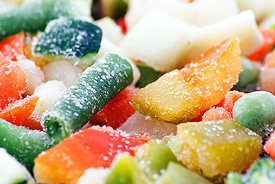Frozen Vegetables vs Fresh
Many of us believe frozen produce contains fewer vitamins and more artificial colors, flavors and preservatives than fresh. But in reality, they are often just as nutritious, if not more so.
Many 'fresh' products spend a long time in storage before finding their way into our kitchens, so by the time we eat them they're drained of vital vitamins. One study found that broccoli traveled an average of 2,095 miles before reaching the Chicago International Produce Market. That's about four days, if a truck is driving 70 mph for eight hours a day. In contrast, most frozen products are processed on the day they are picked, before too many vitamins have had time to be destroyed.

While nutrients like vitamin A, minerals, and fiber are stable, others, like vitamin C, react with oxygen after the vegetable is picked and change chemically so that they no longer function the same way in our bodies. This is called oxidative degradation.
Research shows frozen peas can contain a third more vitamin C than fresh, while frozen green beans can provide two thirds more. In general, frozen products are hassle-free, they keep longer, they're good quality, they're available all year and they count towards your five-a-day.
Frozen vegetables also contain no additives — because they've been frozen to keep them fresh — and freezing also helps to preserve nutrients.
Well worth stocking up on, then.
|